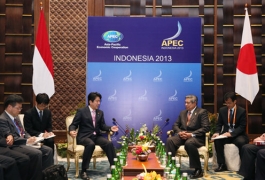Countries & Regions
Japan-Indonesia Summit Meeting

On October 7, commencing at 5:20 p.m. (local time) for approximately 20 minutes, Prime Minister Shinzo Abe, during his visit to Bali to attend the Asia-Pacific Economic Cooperation (APEC) Summit Meeting, held a Japan-Indonesia Summit Meeting with H.E. Dr. Susilo Bambang Yudhoyono, President of the Republic of Indonesia. An overview of the meeting is as follows:
1. Opening Remarks
In response to a greeting by President Yudhoyono, Prime Minister Abe welcomed close communication between the two countries and at the same time expressed his respect to the great efforts made by President Yudhoyono for the success of this year’s APEC process. Prime Minister Abe also expressed his intention to fully cooperate with President Yudhoyono for the success of the APEC Economic Leaders Meeting (AELM).
2. Bilateral Relations
Prime Minister Abe stated that the growth and prosperity of Indonesia are crucial as a driving force of the Asia-Pacific region and he would like to enhance cooperation with Indonesia in fields such as trade, investment, and improvement of infrastructure so that the two countries can contribute to the growth of the global economy together. Moreover, the two leaders welcomed the progress of consultation to expand the bilateral swap arrangement. In addition, President Yudhoyono expressed his expectation to further strengthen the economic relations with Japan through additional expansion of investment from Japan to Indonesia.
3. Regional and International Situations
(1) The two leaders exchanged views on regional and international situations such as issues concerning the South China Sea and Syria. Concerning the South China Sea issue, Prime Minister Abe pointed out that the unity of the Association of Southeast Asian Nations (ASEAN) would be important and confirmed future coordination between the two countries on occasions including the following ASEAN-related summit meetings in Brunei. President Yudhoyono gave an explanation on the consultation for setting a Code of Conduct (COC) and expressed his expectation toward Japan’s support. Concerning the situation of Syria, Prime Minister Abe explained Japan’s assistance for it.
(2) Prime Minister Abe also gave an explanation on Japan’s security policy stating that Japan is determined to even more actively contribute to the peace and stability of region and the world based on the principle of Proactive Contribution to Peace and that the fundamental of Japan as a peaceful state is steadfast. Prime Minister Abe also gave an explanation on the efforts of Japan such as establishment of the National Security Council (NSC) and President Yudhoyono expressed his understanding for such efforts.

